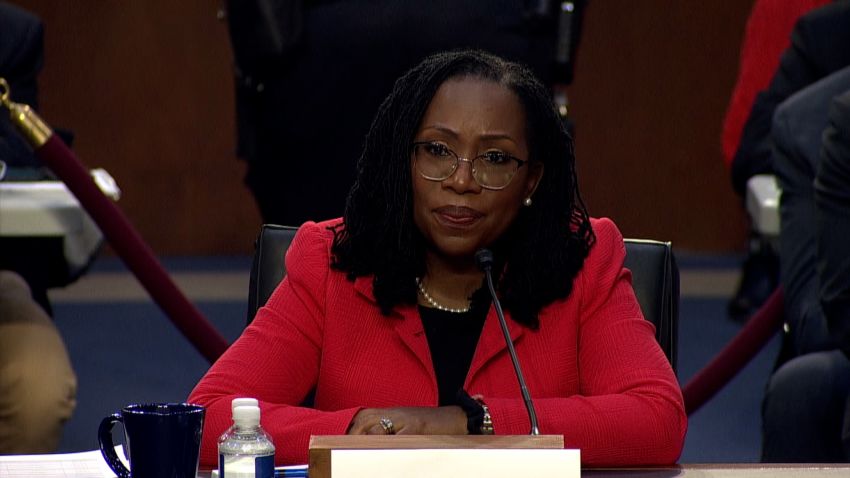Editor’s Note: Peniel E. Joseph is the Barbara Jordan Chair in ethics and political values and the founding director of the Center for the Study of Race and Democracy at the LBJ School of Public Affairs at the University of Texas at Austin, where he is also a professor of history. He is the author of the forthcoming book, “The Third Reconstruction: America’s Struggle for Racial Justice in the Twenty-First Century,” in addition to “Stokely: A Life” and “The Sword and the Shield: The Revolutionary Lives of Malcolm X and Martin Luther King Jr.” The views expressed here are his own. View more opinion articles on CNN.
In the first days of Ketanji Brown Jackson’s US Senate confirmation hearings as the nominee to become the first Black woman associate justice on the US Supreme Court, it’s becoming clearer how long a journey it’s been to get to this moment – and the road that still remains to be traveled.

Tennessee Republican Sen. Marsha Blackburn’s final opening remarks Monday revealed the scope of what Jackson’s up against. Blackburn’s inaccurate and blatantly racist attempts to patronize Jackson while twisting her sterling record into a scare narrative of GOP bogeymen – critical race theory, the 1619 Project and controversies over transgender athletes and women’s sports – were staggering yet unsurprising.
Despite highly visible efforts by Republicans on the committee to discredit, humiliate and smear Jackson, it is well worth remembering why her story matters to so many people. Her origin story as a young Black girl who excelled at some of the best schools in America, served early in her professional career as a public defender, went on to clerk for Supreme Court Justice Stephen Breyer before rising to become a US District Judge and to be confirmed to the US Court of Appeals, is an example of the best part of this nation’s promise. Her story is one that embodies the best of America.
The juxtaposition between Democratic and Republican senators’ questions for Jackson Tuesday, the second day of the proceedings, illustrated the toxic and growing partisan gulf that has transformed American politics from a noble calling to public service into a blood sport. Texas Sen. Ted Cruz offered unintentional comic relief when he asked Jackson to opine about a book promoting anti-racism for infants and young children that he said “is being taught at Georgetown Day School to students in pre-K through second grade.” Cruz accused the Washington, DC, school, where Jackson is on the board of trustees, of supporting critical race theory and demanded that she respond.
“Do you agree with this book being taught to kids that babies are racist?” The nominee, after a pause long enough to indicate apparent contempt for the question, then replied critical race theory was taught in law schools and not in K-12 public schools. She also made the point that Georgetown Day School – like the school where Justice Amy Coney Barrett sat on the board before her confirmation – is a private school.
Cruz at one point held up the book in question as a kind of vulgar prop (while sitting in front of an enlarged reproduction of one of its pages) – essentially ending the GOP’s promise that Jackson’s confirmation hearings would not devolve into some kind of circus.
Tom Cotton of Arkansas and Missouri’s Josh Hawley, two of the most conservative and Trump-loving elected officials in the nation, attempted to attack Jackson as being soft on crime and unusually lenient in sentencing child sex offenders (an assertion that a group of retired federal judges rejected, finding her sentences “entirely consistent” with that of other judges across the country). Democrat Dick Durbin of Illinois, chairman of the committee, offered Jackson a chance to address Hawley’s allegations as laid out in his opening statement Monday.
When Durbin asked Jackson what she thought when she heard Hawley’s allegations, she said as a “mother and a judge who has had to deal with these cases, I was thinking that nothing could be further from the truth.” She then outlined the seriousness with which she takes such cases and the harsh penalties that she has imposed.
The charge that Jackson sentenced child sex offenders to less time in certain cases than prosecutors recommended is particularly offensive, since it reflects a long-standing pattern in American history of attempting to pillory Black women as being incapable of living up to virtuous standards of womanhood. From the days of Sojourner Truth’s 1851 “Ain’t I a Woman” speech that deplored the way in which privileges and promises of protection afforded to White women were denied their Black counterparts, Black women have struggled to have the full measure of their humanity recognized by American legal and political institutions.
Anita Hill, a Black woman who accused then-Supreme Court nominee Clarence Thomas of sexual harassment during his 1991 confirmation hearings, found herself unable to convince an overwhelmingly White and male Senate that her charges were true.
It’s especially galling to watch Hawley, a fierce proponent of so-called traditional (read: White, patriarchal) masculinity, seek to demean Jackson with such baseless attacks against the backdrop of this history.
Cotton attacked Jackson for reducing the sentence of a convicted drug dealer, a decision Jackson made in light of the First Step Act passed in 2018 by Republican President Donald J. Trump. “You chose to rewrite the law because you were sympathetic to a drug fentanyl kingpin,” claimed Cotton. “Respectfully, Senator. I disagree,” retorted Jackson.
While Republicans have focused on Jackson’s “judicial philosophy,” parroting support for an originalist or textualist approach to interpreting the Constitution, a document that in its original form would have denied Jackson her humanity, Democrats on the committee have also sought to place Jackson’s nomination in the long and tumultuous sweep of America’s racial history in more positive ways.
Jackson is poised to change the history of a nation where before the passage of the 1965 Voting Rights Act (legislation whose aims have been notably under threat by Republicans since the Supreme Court’s 5-4 Shelby v. Holder decision), she could have scarcely voted, let alone been considered to sit on the nation’s highest court. As her parents watched with pride, she answered a question from Sen. Cory Booker, Democrat of New Jersey, regarding the historic nature of her nomination.
“I believe that the Constitution is fixed in its meaning,” Jackson asserted.”I believe that it’s appropriate to look at the original intent, the original public meaning of the words when one is trying to assess, because, again, that’s a limitation on my authority to import my own policy views,” Jackson said in reply to Nebraska Republican Sen. Ben Sasse’s question about her views on the Constitution and judicial interpretation.
“Today we should rejoice,” observed Booker in his opening statement on the first day of hearings. He placed Jackson’s rise to the precipice of history within the moral arc of the nation’s political imagination on its long journey from slavery and Jim Crow racial segregation, to the election of a Black President, Vice President, and the first Black woman to sit on the Supreme Court. On day two, Booker followed Cotton and gave Jackson an opportunity to discuss the challenges of work-life balance as the mother of two daughters with an exceptionally busy career. Jackson appeared visibly moved discussing her own at times imperfect efforts to juggle “hearings during your daughters’ recitals” and “emergencies on birthdays that you have to handle.”
In this sense, like former First Lady Michelle Obama, Jackson is a brilliant Black working mother whose love for the law and public service is matched by her love for her family and children. As a Black woman, navigating these multiple roles – as mother, judge and wife – can be more perilous than White counterparts since African American women are still too often belittled and patronized in our society.
This lack of grace and empathy was evident in some of the jaw-dropping language used by members of the committee to describe Jackson – for instance, Sasse told Jackson she was “incredibly likable and winsome.” It seems impossible to imagine the Senator - or others of his colleagues, who praised Jackson’s performance in a similarly gendered terms - speaking these words to a White, male nominee. It sounded for all the world like she was being congratulated for not being an Angry Black Woman.
Black women have, historically, worked tirelessly to transform American democracy and the political institutions that have failed to recognize their humanity, brilliance and power. Since the end of slavery, the quest for citizenship and dignity has proved a particularly difficult one for Black women who – denied voting rights on both the basis of their race and their gender – occupied a political and social limbo. Mistreated by White institutions that saw them less as women than Black and, at times, disrespected in Black communities because they were women, they persisted in keeping Black families afloat and dreams of dignity alive.
The political mudslinging, much of it racist and sexist, being hurled during these confirmation hearings will at best delay – but cannot deny – the inevitable. She will almost certainly be confirmed along partisan lines as the first Black woman on the United States Supreme Court. She stands on the shoulders of giants. They include Black women such as Constance Baker Motley, invoked by Jackson as an inspiration (they share a birthday), who was appointed the first Black female federal judge by President Lyndon Baines Johnson in 1966.
Her confirmation will come four years short of the nation’s 250th anniversary. It will represent a long-overdue recognition of the value of Black women in service of social justice and reflect the power of the American Dream when leveraged in search of the larger purpose and promise of American democracy.




